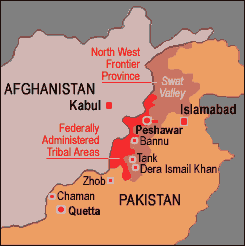Khost

Khost (Pashto: خوست) is one of the thirty-four provinces of Afghanistan. It is in the east of the country. Khost province used to be part ofPaktia province in the past. Its capital is Khost City. Khost or Khowst city in eastern Afghanistan. It is the capital of Khost Province, which is a mountainous region near Afghanistan's border with neighboring Federally Administered Tribal Areas (FATA) and Bannu in Pakistan.
Tribes
The main tribes are:
- Khostwal (clans: Lakkan, Tawizai, Sabari, Shamil, Matun, Mali, Mandozai, Khostwal, Mangal from Musa khil sub branch dominating two district up northwest of khowst and Ismail Khel). Khostwal clan is found in Afghanistan. [1]Khostwal (खोस्तवाल), an inhabitant of Khost in Afghanistan. The Khostwals are not a tribe but include a number of Pathan tribes, such as the Jajis.[2]
- Bangash
- Kharoti
- Zadran
- Sabari
- Dzadzi
- Wazir
- Gurboz
- Kharsin (Mazdak)
- Mangal
There are Ghilzai Pashtuns in smaller number as well.
History
H. W. Bellew[3] writes that Next to the Jadran on the east are the Khostwal and Dawari. The Khostwal, or " People of Khost," inhabit a fertile valley drained by the upper sources of the Shamil, or Keti, river, a principal affluent of the Kuram, which it joins at Zerwam, twelve miles south of the Turi limit at Thal Biland-khel, and are reckoned at four thousand families. They are called Khostwal by their neighbours, and do not appear to have any distinct tribal designation of their own. Though they share the possession of the Khost valley with the Vaziri, who are indeed forcible intruders, they are not allowed to be of the same lineage with them, but are rather looked down on as of inferior descent.
H. W. Bellew[4] tells us that Khost is probably an abbreviation of Khostan " the country of the Kho a Kachwaha tribe, whose original seat was in the Shekhawati, or Shikarwati, hills about Udaipurwati. The Khostwal would thus be the Indian Kho, and the same people as the Kho of Kafiristan, whom we shall meet by-and-by. Like the Afridi, Orakzi, and other Pathan tribes in this part of the Indus frontier, the Khostwal and Dawari, as also the Banu tribes, to be presently noticed, are ranged in two opposite political factions, or gundi; but here they are called Torgundi, or " black faction," and Spingundi, or " white faction," instead of the Samal and Gar previously mentioned. The origin of these factions is not well understood ; but judging from the names Samal and Gar, they probably indicate Buddhists (Sraman) and Magians (Gahar, or Gaur) prior to the establishment of Islam.
Notable persons
External links
References
- ↑ An Inquiry Into the Ethnography of Afghanistan By H. W. Bellew, The Oriental University Institute, Woking, 1891, p.102
- ↑ A glossary of the Tribes and Castes of the Punjab and North-West Frontier Province By H.A. Rose Vol II/K,p.550
- ↑ An Inquiry Into the Ethnography of Afghanistan,p.102
- ↑ An Inquiry Into the Ethnography of Afghanistan,p.102
Back to Jat Places in Afghanistan

